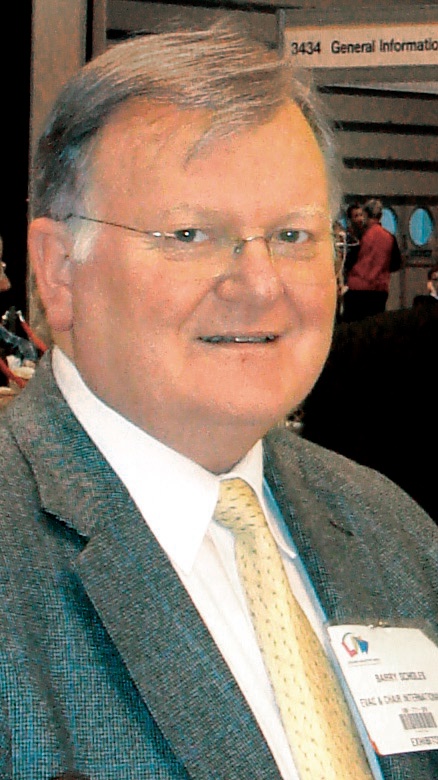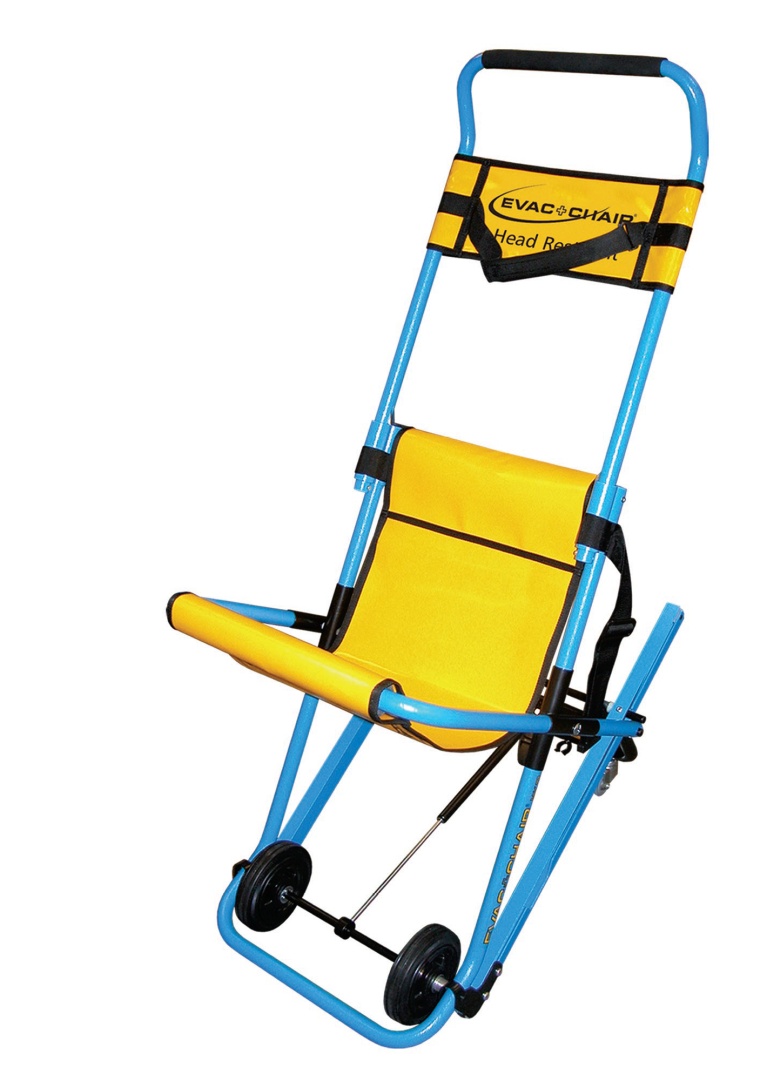Evac + Chair International: GIT-Interview with Barry Scholes about EU Directives for occupational safety and health
Evac + Chair International: GIT-Interview with Barry Scholes about EU Directives for occupational safety and health. What do demographic figures have to do with reformed EU directi...


Evac + Chair International: GIT-Interview with Barry Scholes about EU Directives for occupational safety and health. What do demographic figures have to do with reformed EU directives for occupational safety and health today? How will the work and leisure environment change for the disabled in the next couple of years? Dirk Mager of GIT SECURITY + MANAGEMENT met Barry Scholes, Managing Director Evac+Chair, during Leisure Industry Week trade show in Birmingham to find out more about the meaning of new EU directives, which were coming into force by 1 October 2006.
GIT SECURITY: Mr Scholes, we are meeting here at Leisure Industry Week trade show. Why did you decide to participate to this event? Isn’t it quite uncommon as a company specialised on medical transport products to participate to a show targeting on leisure facilities?
B. Scholes: It might seem unusual at first sight as we are going a unique way here. But I will explain to you why it makes sense to present our product, the Evac+Chairs, exactly here where we can meet customers from leisure related companies.
What was it that triggered your decision?
B. Scholes: What happened is that in the UK we have the Regulatory Reform Order meaning that all our former fire regulations are being replaced by completely new ones. What we have now is applicable to all the hotels, residential care homes, nursing homes, and public places, etc., which were excluded from the original work place act. We are pioneering at this show with emergency evacuation devices, such as the Evac+Chair.
What does this reform of the work place act imply?
B. Scholes: Under the new regulations the protection of guests in hotels, and keep fit gymnasia, etc. is now under the responsibility of the respective management. It has to ensure that fire control systems, evacuation devices and means of fighting fires are in place and ready to use.
Why is the UK government reforming this law act?
B. Scholes: Well, this legislation is an extension of the EU legislation CEE 89/391 extending it from industry and commerce into public places. In the UK this legislation kicked in 1 October 2006.
This means the UK law act comes into place due to the directive by the EU?
B. Scholes: Yes, the European Directives say that by a set day a country must have a law in position. This applies to all other EU member states alike. There is a link from EU legislation to adoption of this act into each country’s legal system.
What results from this process?
B. Scholes: There are two EU Directives that are of importance here: First of all, the EU directive for equality in the work place 2000/43/EC update 2004 secondly, the before mentioned EU directive for health and security 89/391. Both directives initiate a change in the responsibility towards disabled people. From now on, this is not only referring to the employer-employee-relationship, but also applies to the service-provider-customer-relationship. This is a very essential change.
What kind of service provider are you talking about?
B. Scholes: Hotel management, management of leisure centres, gyms, cinemas, amusement parks, cinemas. Just take the Spinnaker Tower in Portsmouth as an example. The tower is a national icon soaring 170 m into the sky as a gateway over the English Channel. The tower’s public viewing decks 100 m above the ground are accessed by two lifts. In the event of fire when lifts cannot be used a solution had to be in place to evacuate the mobility impaired down the 100 m staircase. This is necessary to comply with the Disability Discrimination Act and the Regulatory Reform Order. The Spinnaker Tower has two Evac+Chairs, one at the top of the stairs for public use and one for staff training purposes.
How many disabled customers are we talking about?
B. Scholes: The Equality in Work Place EU directive is directed at discriminations against race, colour, creed, disability and age, sexual orientation as regards to employment and occupation. According to the UK Department of Health 10 % of people in commerce have mobility problems. But, as mentioned, we are not talking about people in commerce but about everyone, as everyone can be a customer.
The UK-based Disability Rights Commission reckons that 11 million people in the UK are showing some form of disability. In Europe 450 million citizens, 10 % of the total population, would be classified as mobility impaired, but 30 % encountered mobility problems, according to the UN sponsored World Fire Statistics Centre (WFSC).
In the US one out of five Americans have some kind of disability, including obesity, and there are 2.5 million wheelchair users in the US, with another 4 million using ambulatory aids of some description, eg canes and walkers.
What is the bottom line here?
B. Scholes: The essential is that there are many more disabled people then expected and that we have to take more responsibility for them then before. This just makes sense from a human point of view! A very striking example is age. Our society is getting older, but having more and more mobility problems. People are staying longer in their jobs before retiring. You cannot dismiss someone from work because of his or her disability. This goes back to the EU directive of Equality in Work Place.
So, age is the new challenge?
B. Scholes: As many as 25 % of employees between 55 and 65 are suffering from mobility problems, including diseases such as osteoporosis and rheumatism. They have to be catered for in spite of their disabilities. Again not only in industry and commerce but also due to knew EU directives affecting the leisure industry. These people are more active than this generation has ever been before. They want to travel, go to gyms, to hotels and spas. This group has a high disposable income which is spent on leisure activities. This is the reason why my company is pioneering in this sector.
Mr Scholes, thank you very much for this interview.
Contact:
Barry Scholes
Evac + Chair International Ltd,
Birmingham, United Kingdom
Tel.: +44 121 7066 744,
Fax: +44 121 7066 746
info@evacchair.co.uk,
www.evacchair.co.uk
most read

When the Internet stumbles: Why DNS is important
When DNS fails, the internet stumbles-AWS outage proves resilience and redundancy are vital for digital trust

Airbus Defence and Space: Security as a strategic pillar of Europe's defense capability
Airbus Defence and Space protects sites, technologies and employees with modern security and cyber solutions - strengthening Europe's resilience in uncertain times

GIT SECURITY AWARD 2026 - The winners have been announced!
GIT SECURITY AWARD 2026: The best safety and security solutions of the year - now an overview of all winners

Training at Fraunhofer SIT: Strengthening resilience against cyber attacks
Knowledge in cyber security is evolving rapidly - continuous training is therefore important.

Integrated and Futureproof: Traka’s Next Chapter
Interview with Stefni Oliver on Traka’s Vision for the Future









